 newsitems
newsitems  French Minister of Public Administration Lebranchu to EuroFora on EU Governance, Citizens, ENA+
French Minister of Public Administration Lebranchu to EuroFora on EU Governance, Citizens, ENA+
French Minister of Public Administration Lebranchu to EuroFora on EU Governance, Citizens, ENA+
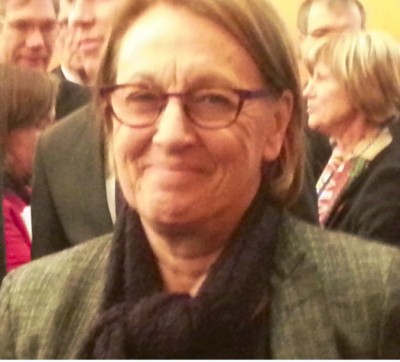
*Strasbourg/ENA/Angelo Marcopolo/- Speaking to "EuroFora" right after her 1st visit to prestigious ENA Higher School for Top Officials in Public Administration, new French Minister for State's reform, Decentralisation and Civil Service, Marylise Lebranchu, stressed that Decisions due to be taken by competent bodies should engage in a better Dialogue with concerned Citizens beforehand, given recent and on-going developments not only in France but also in all Europe+, even if the main political responsibility remains to the authorities elected democratically : A crucial point of timely importance also in view both of ENA's recent mission to contribute into building an education for EU Governance Officials, and of EU's own political developments (See Infra).
---------------------
Symbolically, indeed, the New French Minister's 1st Visit to ENA's Headquarters in Strasbourg, came at the 1st Day of new ENA's 2013/2014 promotion, and on the same day that (French) Government just started working in the New Year 2013 (earlier this Morning in Paris), as observed from the outset ENA's new Director, Nathalie Loiseau, (a Press-experienced former Diplomat, holding a solid Education background also in .. Chinese Culture), surrounded by the President of Strasbourg University, Professor Beretz, and many young and less young ENA students, not only from France but also from Germany and various other EU Countries, as well as from almost all Continents of the World, (f.ex. from USA and Latin America, Japan and Korea, China and Vietnam, Arab and/or Black Africa, etc, including even some pluri-cultural origins' personal synthesis in certain participants, well integrated in their European Host Countries, as "EuroFora" witnessed on the spot).
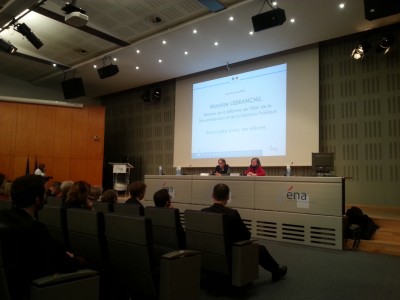
-----------
One of the Questions we subsequently raised being linked to a Core-issue in the current mission of the new French Minister for State's reform, Decentralisation and Civil Servants, "EuroFora" observed from the outset that, during a debate held earlier at the ENA, she "spoke very much about Citizens' role, in relation to a (forthcoming new effort for a) Modernisation of the State".
=> - "Do you think that, in Future, Listening to, and having a Dialogue in proximity" with (concerned) Citizens, "before a (Public Administration) Decision is taken, could be helpful" in this direction, "both in France and in the rest of the EU", given also various converging recent Legal developments in this sense ?, "EuroFora" asked the competent Minister Lebranchu, (See also Infra).
-----------------
- "That's what is usually called "Participatory Democracy", where there are Forums for Dialogue : This can be done f.ex. in (a City's) Quarters, in several (f.ex. Regional, Urban, etc) Territories, etc.", the competent French Minister observed in her positive reply to "EuroFora"s query.
- "Even if the principle of Representative (Democracy) remains of fundamental importance, nevertheless, particularly regarding issues of local, everyday life, etc., it's true that Dialogue should be developed", she acknowledged in this regard.
- For that purpose, "in order to organize such a Dialogue (between concerned Citizens and Public Administration before Decisions are taken : Comp. Supra), "it's important for (Public Administration's) Decisions to be Transparent", (i.e. f.ex. by having being anounced beforehand, by hearing People whose legitimate interests are affected, by being sufficiently and correctly Motivated, particularly regarding concerned Citizens' pertinent Remarks, etc).
- "Because, in fact, Transparency is part of Democracy", Lebranchu (who has served also as Justice Minister in the past) stressed in conclusion of her reply to "EuroFora"s 2nd Question.
---
=> We must build "a Reconciliation between Citizens and Public Administration", and the forthcoming "Modernisation of the State is an important part of it", particularly by "seeking to make Adminisration closer to Citizens and more Transparent", the competent Minister explained earlier.
- "It won't be completed in just 2 or 3 Years", because "it's, in fact, for a longer period", due to start with a forthcoming Draft Law, expected from "March 2013", Lebranchu anounced.
Until now, the "French Model" of Public Administration was mainly based on the History of Liberation and Reconstruction, after the 2nd World War, but recent Changes oblige to reflect anew about the meaning of this choice, while Communication "Technologies evolve and modify the relations between the State and Citizens", she observed, (adding also an Internet Dimension, of fundamental potential also for "EuroFora"s relevant project).
- In fact, while the recent Crises call for "a renovated State interventionism", replying to current needs for more Regulation and more Protection, at the same time, recent developments also call for a "Rehabilitation of Public Service's values", according to the new French Minister.
-------
* Our Question to Lebranchu, (who holds also a useful Experience as former Minister of Justice, under former President Chirac and f. Prime Minister Jospin), was referring mainly to an original Synthesis of Case-Law in the Judicial monitoring of Rule of Law's application to Public Administration's Decisions vis a vis concerned Citizens, particularly in Economic and Social but also other issues, that "EuroFora"s co-Founder had published in a Comparative Study among selected EU Member Countries and defended in public in front of a Jury at Strasbourg's University, which attributed a 18/20 "Very Well" Mention, by Professor Paul Amselek and President Jean Waline, for a PostGraduate Research Diploma, later chosen by the Faculty of Law for a Prize destinated to Doctoral PHD Thesis on a proposal by Professor Amselek (Paris).
Astonishingly, several years later, many among this pioneer Study's main points apparently inspired an important recent Colloquy organized by the "Public Administration pole (PEEAP)" of Strasbourg (an umbrella Group bringing together Strasbourg's Law Faculty and Political Science Institute, ENA, the Institute for Higher European Studies : IHEE, INET, experienced EU Council's Legal Directors from Brussels, etc) , which made also large references to ECHR's case-law and EU's legal new developments in this regard, strengthening Citizens' role in the Public Administration's Decision-making process.
Today, the interesting point obviously is that the current Economic Necessity to build a strong and efficient Economic Governance in Europe, which cannot go without a further, decisive Political Integration at EU or €uroArea+ level, as many EU Leaders recently acknowledged (including particularly German Chancellor Merkel and EU President Van Rompuy's latest Report at December 2012 EU Summit in Brussels : comp. "EuroFora"s DraftNews from the spot, already sent to Subscribers/Donors+), naturally calls for a parallel, important Democratic Legitimation vis a vis EU People, (comp. already German Minister Schauble's statements of September 3, 2012 at the CoE in Strasbourg : .....), which brings into play both EU Parliament and Direct forms of Dialogue with concerned EU Citizens, including via Lisbon Treaty's "Good Administration" general new Legal Clause (2010), that EU Ombudsman, Professor Nikiforos Diamanturos, has already started to use, more and more widely, (as he had earlier anounced to "EuroFora", precisely in relation to EU Citizens affected by Public Administration's Decisions ruled by EU Law).
----------------------------------------
- "Our Citizens denounce the insufficiently democratic and obscure (shady) character of Public (Administration's) Decisions", acknowledged, this same Day, the French Prime Minister Ayrault in a text calling for "a New Model" of State-Citizen relations, published by mainstream Newspaper "Le Monde".
+ In addition, they "are abstaining from voting or are attracted by extremism", while "Mistrust paralyses our Social and Political Life", he also noted, anouncing a relevant "Roadmap" for the next 6 Months, but also the start of work for a "Big Task" ahead.
=> In consequence, we "must reform our Institutions so that the People won't have, no more, a feeling to be monitored by a distant Political Class, which concentrates excessive powers", he observed.
>>> That's why, "we have chosen a Method : Dialogue and cooperation between the State, Civil Society -i.e. Social partners, Associations and Citizens- and Local/Regional Authorities", Ayrault's text claims.
- "Concertation and Negotiation might stir frustrations, are less Mediatic than a series of anouncements not followed by Acts", but we must "deeply Renovate the French Model, in order to adapt it to the present times (era), and give a New reality to its founding, Republican Values" in front of the "Big Challenges open before us", according to the French Prime Minister.
-----------------------------------------------
+ Meanwhile, after stressing at ENA's Debate that Public Administration's manifold activities have to face similar main challenges and respect the same basic Principles, regardless of whether they were led by the Central State, by Local/Regional Authorities or other various Public Entities, the competent Minister for Local/Regional "De-Centralisation" pronounced herself in favour of a "balanced", new "Regionalisation", acknowledging legitimate Differences between various Regions, but with the Central State remaining always as a Guarant, aiming at more efficiency and taking particularly into account the Future, f.ex. of the Rural space, including Agriculture, which becomes "a Big Issue of the 21st Century", as she pointed out.
+ "All Regions are not alike : f.ex., what counts for (Strasbourg's Region) Alsace is not reproductible in Marseille-Aix en Provence", etc., and, while "Public Administration's main principles should be everywhere respected, both in the action of the Central State, as well as in that of Regions, Municipalities, etc., on the contrary, there is a Regional Diversity, situations are not the same between various Regions, such as (Paris' region) Ile-de-France and (Strasbourg's region) Alsace, which are marked by a lot of Differencies", the New French Minister competent also for Decentralisation added, while also pointing at the "2 Euro-Metropolitan Regions", engaged in Trans-Border links, around Lille and Strasbourg, at the Franco-Belgian and Franco-German borders.
-----------------------
- More generally speaking, on all issues, "France's problem was that it had a Strong profile internationaly, while it was, at the same time, very anxious on its destiny, inside itself", Minister Lebranchu found.
- But "I think that the period of great Difficulties is behind us, on condition that we really know what we expect from .. the activities of Public Administation, both for France and for all Europe", she optimistically but carefully stressed.
- "Sometimes, we were very European in words and speeches, but not enough European in our everyday Life" in real practice. - F.ex., we have a Ministry for EU affairs, which is rather a Ministry for European Negotiations, but not yet a Ministry to create Links and cooperation between France and other EU Countries", while "that's where we still have to make progres", Lebranchu critically highlighted.
- "I am personally quite Optimist for France, and I think that if we succeed, in all areas, to create Links with other EU Countries, not only in Negotiations, i.e. in confrontations, but in Coooperation, then, France has a good card to play for Europe's Future. But we are not yet there", she ambitiously, but realistically criticized.
------------------------
+ On ENA's evolution towards a School of European/International Governance :
------------------------
+ Another "EuroFora"s Question raised to the new French Minister was whether she endorsed Today a "Dream", or rather a Stratregic choice, expressed in the Past, from those who had taken the Historic Decision to transfert ENA from France's National Capital : Paris, to a City located at the Franco-German border, between Luxembourg and Switzerland, claiming to be a "European Capital" : Strasbourg, i.e. mainly to help develop a kind of Top Experts' "School for a "European/International Governance".
- "That's true. I think so". And, at least, "I hope that there are also other" relevant European actors who will share this view in Future, Lebranchu positively replied to "EuroFora".
----------------------------
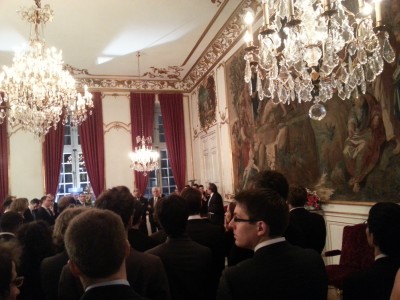
+ "ENA has the Chance to be located in a European City with an important History, (particularly of more than 1 Thousand Years of European Reconciliation : i.e. from the "Oath of Strasbourg", which formalized an agreement between Charlemagne's 2 Sons and Heirs, back on the 9th Century AC, up to the 1949 establishement of the Council of Europe, soon followed by that of EU Parliament's Plenary Sessions, ECHR and EU Ombudsman, "Shengen" system, EUROCORPS, HUMAN FRONTIER Global project, International Space University, ARTE radio-TV, etc), where you can often meet Europe, observed later the French Minister later-on, during a welcome visit to the Historic City Hall, where Mayor-Senator Ries reminded Strasbourg's over-Millenary European dimension, recently focusing mainly on Democracy and Human Rights, as well as its current choice for "Euro-Optimism", against "Euro-Sceptiscism", as a timely adopted subtitle indicates...
----------------------------
+ However, Lebranchu appeared careful not to assimilate Franco-German models of Public Administration, surprising some ENA's new students, a.o., etc., as they didn't hesitate to clearly say so, during an earlier Debate at ENA's Auditorium (See Infra) :
- Replying to a Question on whether the "Franco-German cooperation" and "France's integration into the EU" would influence the "Reform of the State", Minister Lebranchu surprized by stressing that "there is a French model, and a German model" for Public Administration, which are not identic : - "We'd better Stop thinking that France and Germany would always "evolve in parallel", as a kind of "Mirrors". On the contrary, "Germany has another, different History", more difficult or complex, and it's better "for each one to be itself, first of all", she replied. "But one can expect a better Understanding". "We are no more in the After 2nd World War era, when it was, at the same time, Horrible but also Easy, striving for Peace and Reconstruction, while now, during your younger Generation, you shall turn this page definitively : We are no more in an After-War era. There is the European Construction and a hope to build even more".
- In this regard, "my personal opinion ....is that there is not only the Franco-German couple. It's true that, without the Franco-German couple EU cannot advance much further, but we'd better learn also how to advance together with other" EU Countries too, she advised. Because, "If we simply continued to advance alone, French and German, thinking that we represent all Europe, then we'd risk to lose something important, which is a real European construction". On the contrary, - "I believe that what we can do, as Franco-Germans, is to find out how to better speak also to other EU Countries", F.ex. "what France and Germany could do together, is to find a better Language to speak more Eastwards, for Germany, and Southwards, for France. So that if Germany speaks better to the East, and we (France) speak better to the South, then, we'll have a real chance to succeed", new French Minister Lebranchu concluded.
An idea which, given the fact that further Eastwards is also Russia and even China, etc., while further Southwards is Africa, etc., obviously should imply also the establishment of a particularly Strong Franco-German link, able to ensure a solid cohesion of Europe...
----------------
+ Replying to another Question from a German-origin participant to the Debate held at ENA earlier today, who focused on the existence, today, also of "one, common History, both for France and Germany, where, what is at stake is essentially similar, while they are both the main play-ground for Europe's Future, which is the main aim, the new French Minister appeared rather less reserved :
- "Your are right", but "I think that when a country, like France, has its own Model (for Public Administration), it should assume its main characteristics and try to modernize it, without feeling always obliged to search to find a "Mirror" at another Country", Lebranchu started in her reply in Public.
- "However, you are right about the Origins of the European construction : And it's always question about the "Franco-German couple", because we all know that , if this couple doesn't work, then, Europe wil be in difficulty", she agreed.
- "However, once that we have been convinced about that, we have become able to work together without closing ourselves in our own History, since that would risk to make us insufficiently aware of the fact that EU is made of 27 Member Countries, and that, therefore, we must be open and speak also to other" EU Countries, she went on to add.
- "Something to which I don't always pay sufficiently attention, mainly concerning developments in other (EU) Countries, so that I think that French and German People, who have the Chance to be at the Core of the European Construction, and in a comparatively rather better situation, ....
should be Careful enough so that nobody else might eventually feel excluded. F.ex., I've often participated in EU Negotiations where, sometimes, 1 or 2 EU Member Countries which had Different Interests, had been rather neglected, kept out of the main negotiations, that were focusing, almost exclusively, into finding a way for France and Germany to advance forward".
- In other words, "Yes, we (France and Germany) are of a Vital Importance for the European Construction ; Yes, we have a Common History, but we must not forget that others (EU Countries) who have another History, and had gone away for a moment in the Past, also need that we pay attention to what they really are, where they came from, and how we could help them. It's just a matter of attention, nothing else.
-------------------------
+ Replying afterwards to another question, during that same Debate at ENA, about the fact that France and Germany are facing "similar Structural Challenges", vis a vis the Global Financial Crisis, while Berlin has already managed to take some apparently Efficient Measures, particularly concerning "Competitiveness", which might inspire Paris too, Lebranchu was more careful :
- "I think that we must be careful, because, in fact, France and Germany are at Different Situations today", the New French Minister found.
- "One of them seems to be in a rather Better situation than the other, particularly concerning Competitiveness. But there are also various other Advantages", f.ex., France has a dynamic Demography today, while Germany has some concerns in this regard. Perhaps, Germany has managed to accomplish some developments, that France didn't yet. But, I'm not sure that we could advance both at the same time, on the same issues", Lebranchu hesitated.
- "F.ex., the French and the German Trade Unions have nothing to do" the one with the other, since the Co-Management in Germany allowed for some things to be done, which were not feasible in France., etc. On the contrary, recent developments on the role of Trade Unions in Social relations, which became very important, might make possible today in France certain things which could be Similar to what has happened in Germany", she observed.
- "But, despite that, you can also have some Difficulties at the German side : F.ex., since there isn't in Germany a Guaranteed InterProfessional Minimum Salary ("SMIG" in France), Germany can take parts of the Agro-Alimentary Market vis a vis France, sometimes in an almost brutal way, since you can have some Workers in Germany whoi are paid only 175 up to 250 € per Month, (instead of 1.450 € currently in France, for a full Monthly work), which cannot really become a Model, I think", + "Moreover, Germans are, today, worried for some Sectors which face Problems coming from elsewhere", she pointed out.
- "So, there are some very Different problems, and, in consequence, I don't think that we should spend so much Time by merely expecting from France to evolve exactly as Germany did.. France must certainly evolve. Germany must evolve. But not necessarily in an identical way", the New French Minister believed.
- "Nevertheless, you are Right when you say that the Target is the same : It's always Competitiveness", she admitted. However, in Germany, there are, f.ex. many concerns about what will be the situation of German Industry after 15 Years, (i.e. in 2027). In France, there are also many concerns about the present situation of Industry, which has asked State's help., so that an Industrial Plan is, I think, currently unter preparation => "I.e. the Problems don't evolve exactly at the same pace at exactly the same way", she found.
=> "Attention : There isn't any single Global Model. There isn't even a European single Model !", Lebranchu warned.
- "Perhaps, we might find one, in terms of a Decade of Social Law, in French History, or when, f.ex., France had thought that the Economy of Services was its road ahead, while the Industrial Economy would be that of Germany. But that was a Political choice, and that's something different", she concluded, (without entering into details, nor developing further).
-----------------------
(NDLR : "DraftNews", as already sent earlier to "EuroFora"s Subscribers/Donors. A more accurate, full Final Version may be published asap).
***
Main Menu
Pagina principale Press Deontology/Ethics 2009 Innovation Year EU endorses EuroFora's idea Multi-Lingual FORUM Subscribers/Donors FAQs Il Elxis licenza EuroFora supports Seabird newsitems In Brief European Headquarters' MAPs CoE Journalists Protection PlatformBRIEF NEWS
- 00:00 - 02.06.2021
- 00:00 - 18.10.2020
- 00:00 - 19.06.2020
- 00:00 - 18.05.2020
- 00:00 - 20.04.2020
- 00:00 - 02.02.2020
- 00:00 - 09.12.2019
- 00:00 - 27.11.2019
- 00:00 - 16.11.2019
Popular
- Yes, we could have prevented Ferguson riots says World Democracy Forum's Young American NGO to ERFRA
- Spanish People Elect CenterRIGHT Majority with 1st Party and Total of 178 MPs (6 More than the Left)
- Pflimlin's vision
- The European Athletic "Dream Team", after Barcelona 2010 Sport Championship Results
- Source Conseil d'Europe à ERFRA: Debatre Liberté d'Opposants à Loi livrant Mariage+Enfants à Homos ?
- Head of BioEthics InterGroup, MEP Peter Liese : "Embryonic stem cell research reaching its END" !?
- Spain: Jailed Turkish Terror suspect with Explosive,Drones,Chechen accomplices stirs Merah+ Burgas ?
- UN Head Ban Ki Moon at CoE World Democracy Forum : - "Listen to the People !"
Latest News
- EUOmbudsmen Conference 2022: Digital Gaps affect People's Trust threaten EF Project on EU Future ?
- French Election : Black Out on Virus, but Obligation for Fake 'Vaccines" Challenged
- Both French Presidential Candidates point at "Humanism" in crucial times...
- France : Zemmour = Outsider may become Game Changer in Presidential + Parliamentary Elections 2022
- PACE President Cox skips Turkey Worst (Occupation) case compared to Russia (DeMilitarisation) query
Statistics
Ospiti: 56810642Archive
Login Form
Other Menu
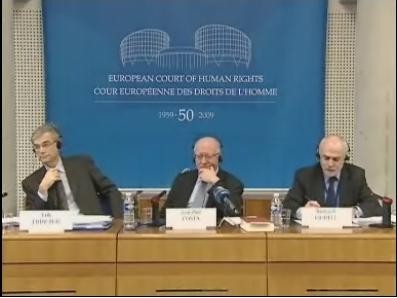
ECHR's President to "EuroFora" on Journalists Gongadze and Adali murders : Principles must apply to all States, without discrimination.
+ ECHR's Statistics on Freedom of Expression (See below).
European Court of Human Rights' President, Jean-Paul Costa, questioned by "EuroFora" on Journalists' murders, as in Gongadze and Adali's cases etc., strongly stressed all CoE Member States' obligation to make efficient Investigations to find and punish those responsible, and underlined that ECHR's case-law's principles must apply to all without any discrimination.
His call was clearly supported by various Top MEPs who denounced a risk of "Double Standards" if some Journalists' murders are investigated, while others don't.
To avoid such risks, CoE's Parliamentary Assembly adopted a Resolution, on the occasion of Ukranian Journalist Gongadze's murder, "stressing", as a matter of general Principle, "the importance it attaches to the safety of Journalists and political activists, especially those linked to opposition groups, in ALL member states of the CoE". All "crimes against journalists and political activists must be investigated ... as a matter of priority, without political interference".
Costa was replying to "EuroFora"s question on the fact that, after CoE's Committee of Ministers, also CoE's Assembly had just adopted a Resolution on Gongadze murder case, based on an ECHR's judgement of 2005, asking a full Investigation from Ukraine, who has found and condemned in 10 years of jail 2 executants, but not yet the instigators.
While nothing similar was yet done for dissident Turkish Cypriot Kutlu Adali's murder, with 5 bullets shot at his head out of his Family's home in the territories of Cyprus occupied by Ankara's army, despite another ECHR's judgement of the same year 2005, and despite Turkey's claim that nobody was found among those responsible for the murder, and that there was nothing more to do..
In order to be credible and efficient, CoE's mechanisms shouldn't find a way to at least ask for full investigations of all Journalists' murders anywhere they might be committed, without exceptions ?
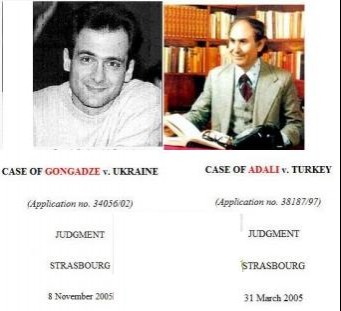
- "On the larger question that you raised, I'd like to say, since we are in a period of stock-taking on ECHR's 50 Years, that the Court's case-law developed certain concepts ....such as the Positive obligations of States, part of which are also the procedural obligations", started to reply ECHR's President.
- "Whenever Journalists, Lawyers, Defenders of Human Rights, or even simple Citizens are murdered, the States are held responsible, not only if its their own security forces' agents who committed these murders, but also if they didn't make sufficiently substantial and efficient Investigations", he stressed.
- "I want to strongly underline that we (ECHR) have found in many cases numerous violations of Articles 2 and 3 against States, ....(about) murders or torture, ...because they didn't make enough Investigations in order to try to find and punish those responsible".
- "We (ECHR) do that vis-a-vis all 47 (CoE) Member States, without any discrimination".
"Naturally, the circumstances in each particular case may be differend, and we can't ommit to apply the rules of proof, or the rules of criminal procedure".
"But we try, by all means, to apply these principles of our case-law, to all States", he concluded.
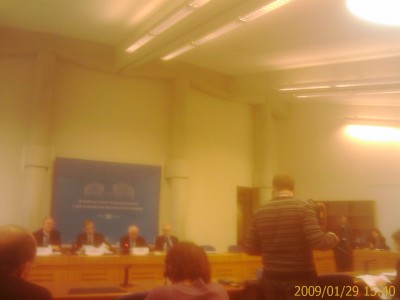
Costa's call was strongly supported by several Top CoE MEPs, from various Political areas
- "To investigate the murder of one Journalist, and not of another, looks like Double Standards", denounced the President of EuroLeft Group in CoE's Assembly, Dutch MEP Tiny Cox.
- "What is the reason ? Politics or specificity of a case ? Of course, if Cyprus and Turkey are involved, it's always a Political case"..
- "Murders of Journalists should always be fully investigated, because killing Journalists is not only killing persons, but also killing Free Press". "We (CoE's Assembly) should do our outmost to help People who are working on Free Press and they are under threat or murdered".
Because for Free Politics, Free Press is a pre-requisitive : Parliamentarians cannot function without a Free Press. Not investigating, is not protecting ourselves".
So we should investigate all Journalists' murders : We are talking about Gongadze, about the Cypriot man (Adali), about the Journalist murdered in Moscow one week ago, etc", Cox concluded
- "CoE can' look at these cases differently. CoE can't wear Blinckers !".
- "If the one is investigated, so has to be also the other. Why there wasn't full investigation ? Why's that ?", wondered British Socialist MEP, Alan Meale.
- "A good idea" would be to "make a Motion for Resolution", and "join all Journalists' murders. Adali and Gongadze etc", said to "EuroFora" EU Parliament Political affairs Committee's President, Goran Lindbland, ChristianDemocrat MEP from Sweden.
(See also earlier News at "EuroFora" on similar issues).
-------------------------------
ECHR's Statistics on Freedom of Expression :
Almost Half of condemnations by ECHR for violations of Freedom of Expression in 2008, concern Turkey : 20 out of a total of 48 for all CoE's Member States.
Russia, Poland, France and Moldova were condemned only 3 times. Romania, Greece, Portugal, 2 times, and the other CoE Member States only 1 time, or none.
--------------------
During the last Decade : 1998 - 2008, Turkey was condemned for violating Freedom of Expression in ..169 cases, while Austria only in 24.
France and Moldova in 14 and 13, respectively, closely followed by Russia and Poland with 11 and 10, respectively. The rest of CoE Member States had less than ten condemnations.
Polls
SMF Recent Topics SA
- Record Hospitalisati... (0) da Breadman
- How Many Infected by... (1) da Thunderbird
- Real Cause for Europ... (0) da Breadman
- Interesting Australi... (0) da Aurora
- Plus de mRNA Faux-&q... (0) da Aurora
- EU: Lukashenko as E... (0) da WKalina
- Why NATO in Ukraine,... (0) da Geopol
- Afghanistan's key : ... (0) da Thunderbird
- Anti-Pass Demonstrat... (0) da Aurora
- Veran - Fioraso : Mê... (1) da JohnsonE


















